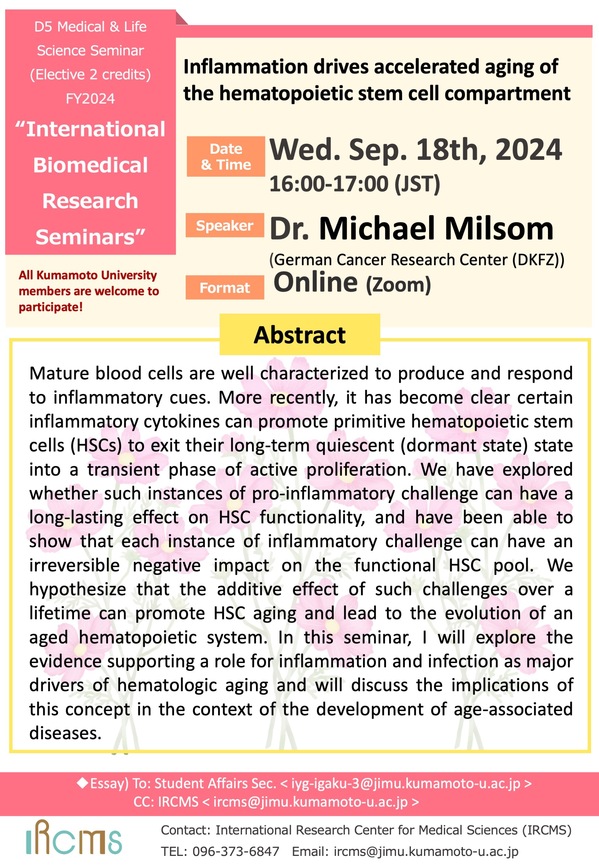- HOME
- News & Events
- [Sep. 18] D5 Seminar- Dr. Michael Milsom (German Cancer Research Center (DKFZ))
News & Events
[Sep. 18] D5 Seminar- Dr. Michael Milsom (German Cancer Research Center (DKFZ))
August 30 2024
The "D5 Medical & Life Science Seminar" course will be offered by International Research Center for Medical Sciences (IRCMS). It will run from May 2024 to March 2025, with lectures given by scientists who are affiliated with IRCMS or in collaboration with researchers at IRCMS. The lectures will be given once a month, in English, and by leading scientists in the relevant research field. Students will be taught: 1) how normal physiological functions are maintained in the human body; 2) how these systems become abnormal under certain pathophysiologic conditions; 3) why stem cells are important in animal development and homeostasis; 4) how stem cell-based approaches can help us understand disease mechanisms and find potential cure for diseases related to stem cell malfunction (e.g., cancer, aging).
Anyone who wants to join is welcome.
For students who have registered for the course, please check your attendance in Moodle.
Date : September 18th, 2024 (Wednesday)
Format : Online (Zoom)
Time : 16:00 - 17:00 (JST)
Speaker : Dr. Michael Milsom (German Cancer Research Center (DKFZ))
Title : Inflammation drives accelerated aging of the hematopoietic stem cell compartment
Abstract :
Mature blood cells are well characterized to produce and respond to inflammatory cues. More recently, it has become clear certain inflammatory cytokines can promote primitive hematopoietic stem cells (HSCs) to exit their long-term quiescent (dormant state) state into a transient phase of active proliferation. We have explored whether such instances of pro-inflammatory challenge can have a long-lasting effect on HSC functionality, and have been able to show that each instance of inflammatory challenge can have an irreversible negative impact on the functional HSC pool. We hypothesize that the additive effect of such challenges over a lifetime can promote HSC aging and lead to the evolution of an aged hematopoietic system. In this seminar, I will explore the evidence supporting a role for inflammation and infection as major drivers of hematologic aging and will discuss the implications of this concept in the context of the development of age-associated diseases.
2-3 Major Papers:
- Bogeska R., Mikecin A.-M., Kaschutnig P., Fawaz M., , Büchler-Schäff M., Le D., Ganuza M., Vollmer A., Paffenholz S.V., Asada N., Rodriguez-Correa E., Frauhammer F., Buettner F., Ball M., Knoch J., Stäble S., Walter D., Petri A., Carreño-Gonzalez M.J., Wagner V., Brors B, Haas S., Lipka D.B., Essers M.A.G., Weru V., Holland-Letz T., Mallm J.-P., Rippe K., Krämer S., Schlesner M., McKinney Freeman S., Florian M.C., King K.Y., Frenette P.S., Rieger M.A. and Milsom M.D. (2022) Inflammatory exposure drives long-lived impairment of hematopoietic stem cell self-renewal activity and accelerated aging. Cell Stem Cell. 29(8):1273-1284
- Cagan A., Baez-Ortega A., Brzozowska N., Abascal F., Coorens T.H.H., Sanders M.A., Lawson A.R.J, Harvey L.M.R, Bhosle S.G, Jones D., Alcantara R.E., Butler T.M., Hooks Y., Roberts K., Anderson E., Flach E., Spiro S., Januszczak I., Wrigglesworth E., Perkins M.W., Deaville R., Druce M., Bogeska R., Milsom M.D., Neumann B., Gorman F., Constantino-Casas F., Peachey L., Bochynska D., St. John Smith E., Gerstung M., Campbell P.J., Murchison E.P., Stratton M.R. and Martincorena I. (2022) Somatic mutation rates scale with lifespan across mammals. Nature. 604:517-524
- Walter D., Lier A, Geiselhart A., Thalheimer F.B., Huntscha S., Sobotta M.C., Moehrle B., Brocks D., Bayindir I., Kaschutnig P., Müdder K., Klein C., Jauch A., Schroeder T., Geiger H., Dick T.P., Holland-Letz T., Schmezer P., Lane S.W., Rieger M.A., Essers M.A.G., Williams D.A., Trumpp A. and Milsom M.D. (2015). Exit from dormancy provokes DNA damage-induced attrition in haematopoietic stem cells. Nature, 520(7548): pp549-552).
Flyer: (Click to enlarge)

